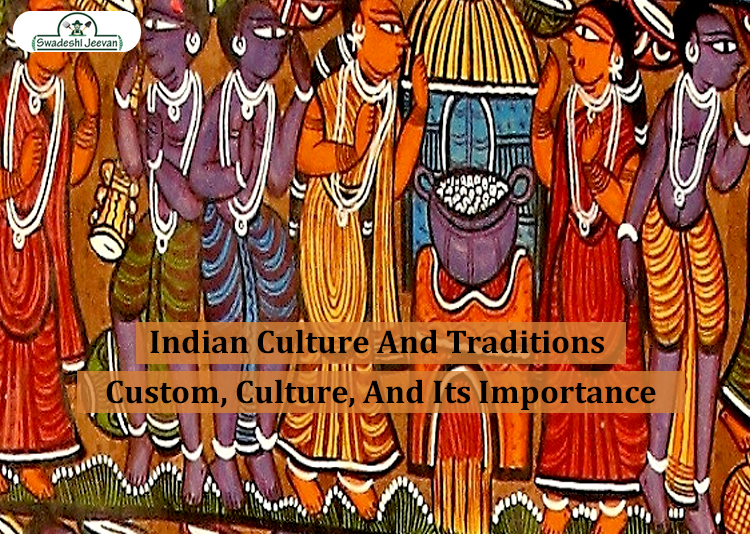Indian Culture And Traditions | Custom, Culture, And Its Importance

Indian culture and traditions cover a huge range of variation as India itself is the 7th largest country in the world. Indeed its land is covering a total area of 3,287,263 square kilometers, and the population is hitting up 1.3 billion. Furthermore, Indian culture began about 4,500 years ago.
ALL WORLD GAYATRI PARIWAR (AWGP) organization describes it as "Sa Prathama Sanskrati Vishvavara." Hence it is the first and the supreme culture in the world.
What's inspiring about Indian traditions and culture?
INCREDIBLE INDIA this is what the tourism tagline of India says. Let's see what is so Incredible about India.
Read More: Popular Customs of India | Swadeshi Jeevan
Customs and their Importance
Customs hold great importance in the lives of people. It not only enriches our values but makes us more attached to our roots.
Religion and Spirituality
Indian culture and traditions consist of more than six languages. Spirituality is a major part of it. Spiritual wisdom is the ornament of India. In Spite of having so many religions, spirituality keeps everyone together.
Spiritualism in India teaches about the philosophy of life, the correct way to live it, and the right way of thinking. If we bring together all the religions, we could find the common plot of all is honoring God and celebrating fully.
The Indian language
Indian language consists of over 300 languages and dialects. The various religions bring up a variety of languages. But, Hindi is the official language that is being used in India. India is adopting English as the second official language with increasing literacy. Writing came to India much earlier. It emerged in 1500 BCE, and then it kept on evolving.
Traditional welcome
Greeting people by joining hands and bending their heads is the traditional welcome offered as NAMASKAR. It symbolizes love and respect to whom we are greeting. And then, a tilak is applied between the space of eyebrows. This tilak is either of kumkum or chandan.
The energy stays at this spot; thus, applying Chandan or kumkum helps to keep energy positive. "Atithi Devo bhava" is also used by the tourism ministry of India to appreciate the rich Indian tradition and culture.
Clothing
Indian traditional dresses vary in different cultures. It started with spinning khadi and then got going. For men, either Dhoti-kurta or lungi is traditional.
Whereas for women, a saree or long skirt (lehenga) and choli(top) show the traditional culture of India. Indian traditions and culture include its own beauty of cotton. India is eminently known for growing cotton.
Architecture and art
Architecture and art depend upon its history, religion, and culture. Taj Mahal the best specimen of Indian architecture. In 1653 it was well built on the Mughal ruler of Shahjahan's order in memory of his love Mumtajjahah.
Hence, Indo-Islamic and Hindu-temple architecture are the most famous styles of historical architecture. Harappan is additionally a brilliant architectural example of the Indus valley civilization.
Handicrafts
Handicrafts are creative handicraft products. They are the mirror of ethenic heritage and traditional values. Moreover, handicrafts made in India are famous for ages like the Kashmiri woolen, woodwork, applique, and metalwork, etc.
These crafts have an attractive appeal that shows the beauty and dignity of Indian handicrafts all around the world. Indian handicrafts have three wide categories: commercial crafts, folk crafts, and religious crafts.
Folk and tribal art
Folk art is a beautiful, aesthetic art and sensibility. Rajasthani miniature, Madhubani, Worli folk, kalamezhuthu, and many more artworks. Tribal art is not only about paintings. Rather, there are home decorations, ornaments, etc. Indian pottery is also famous abroad due to its scientific benefits.
Tribal art, like folk art, has developed the constant efforts of the Indian government and organization. The flavor of music, the comfort of clothing, and agriculture have their own uniqueness and goodness of India.
The Vedas
Veda means knowledge, which was well written in the Vedic period between 1500 to 500 BCE in the northern region of India. The four significant vedas are RIG, ATHARVA,SAMA and YAJUR VEDA.
These Vedas provide cultural and spiritual learning as well as various knowledge about the cure to life. These Vedas said, "the heart of Hinduism." As these Vedas provided development to mankind along with the righteous ways, which modern science craves for and Vedas stand for.
Beauty and uniqueness have become synonymous with Indian culture and traditions. Indeed India is a place where nature is being worshipped, animals are being treated as beloved, and guests are being treated as gods.
Indian traditions and culture hold their uniqueness which initiates humanity. In Spite of having more than six major religions and above 750 dialects, people live together happily here.
Categories: Rituals and Science
Attachments: